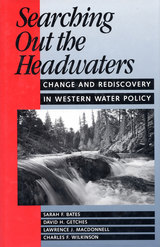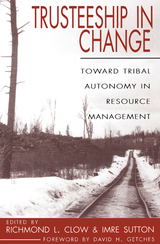
Much has been written about Indian water rights; for the many tribal and non-Indian stakeholders who rely upon western water, this book now offers practical guidance on how to negotiate them. By providing a comprehensive synthesis of western water issues, tribal water disputes, and alternative approaches to dispute resolution, it offers a valuable sourcebook for all—tribal councils, legislators, water professionals, attorneys—who need a basic understanding of the complexities of the situation.
The book reviews the history, current status, and case law related to western water while revealing strategies for addressing water conflicts among tribes, cities, farms, environmentalists, and public agencies. Drawing insights from the process, structure, and implementation of water rights settlements currently under negotiation or already agreed to, it presents a detailed analysis of how these cases evolve over time. It also provides a wide range of contextual materials, from the nuts and bolts of a Freedom of Information Act request to the hydrology of irrigation. It also includes contributed essays by expert authors on special topics, as well as interviews with key individuals active in water management and tribal water cases.
As stakeholders continue to battle over rights to water, this book clearly addresses the place of Native rights in the conflict. Negotiating Tribal Water Rights offers an unsurpassed introduction to the ongoing challenges these claims present to western water management while demonstrating the innovative approaches that states, tribes, and the federal government have taken to fulfill them while mitigating harm to both non-Indians and the environment.

To the uninitiated, water policy seems a complicated, hypertechnical, and incomprehensible subject: a tangle of engineering jargon and legalese surrounding a complex, delicate, and interrelated structure. Decisions concerning the public's waters involve scant public participation, and in such a context, reform seems risky at best.
Searching Out the Headwaters addresses that precarious situation by providing a thorough and straightforward analysis of western water use and the outmoded rules that govern it. The authors begin by tracing the history and evolution of the uses of western water. They describe the demographic and economic changes now occurring in the region, and identify the many communities of interest involved in all water-use issues. After an examination of the central precepts of current water policy, along with their original rationale and subsequent evolution, they consider the reform movement that has recently begun to emerge. In the end, the authors articulate the foundations for a water policy that can meet the needs of the new West and discuss the various means for effectively implementing such a policy, including market economics, regulation, the broad-based use of scientific knowledge, and open and full public participation.

This book also includes case studies focused on wildlife management, forest preservation, tribal hunting laws, and other specific concerns in management, preservation and utilization of Native American land. An excellent source for scholars in the fields of Native American and environmental studies, Trusteeship in Change is sure to spark debate and to be an important reference book for years to come.
READERS
Browse our collection.
PUBLISHERS
See BiblioVault's publisher services.
STUDENT SERVICES
Files for college accessibility offices.
UChicago Accessibility Resources
home | accessibility | search | about | contact us
BiblioVault ® 2001 - 2024
The University of Chicago Press









